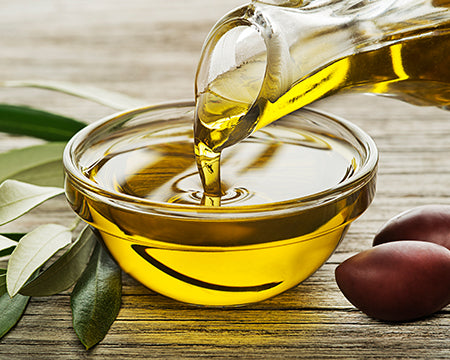Olive oil is a staple ingredient for many culinary preparations and can also support better health because of its high antioxidant and specific vitamin content. Olive oil can contribute to better outcomes for diabetes, heart problems, arthritis, and high cholesterol. It can also aid in weight loss, improve metabolism, digestion, and delay aging.
Extra virgin olive oil contains the highest level of antioxidant polyphenols and oleic acid. It is thus a healthier option compared to other vegetable oils.
Olive Oil Nutrition Facts
Rich in antioxidants, vitamin K, and vitamin E, olive oil boasts a very good nutritional profile. It contains monosaturated fats like oleic acid and palmitoleic acid, which constitutes 10g of the total fatty acid count of 14g in this oil. Olive oil is also free of carbs and cholesterol, thereby reducing the risk of heart diseases. The calorie count of this oil is similar to canola oil or butter, at around 120 calories in 1 tablespoon of olive oil.
Health Benefits of Olive Oil
Reduces Heart Problems
Natural olive oil contains 70% monounsaturated fatty acids. As a result, it can lower cholesterol accumulation in the blood and may reduce heart problems.
Lowers Cholesterol Levels
One of the many benefits of olive oil is its ability to help lower the bad cholesterol levels (LDL) in our blood, as it is rich in monounsaturated fats. LDL cholesterol is the bad type of cholesterol, which increases the risk of heart attacks and pulmonary heart diseases. Extra virgin olive oil, which is rich in almost 40 antioxidant chemicals, may help reduce the oxidation effects of LDL cholesterol. It can also help increase the HDL cholesterol levels.
Weight Loss
Medical experts suggest that it is very difficult to gain weight from the monounsaturated fats present in olive oil. Research on Mediterranean olive oil has shown positive results with regards to using it for weight loss.
Boosts Metabolism
Olive oil boosts the metabolism, the growth of good bone structure, and brain development in children. It is an excellent source of vitamin E, which is very beneficial for older people.
Prevents Inflammation
Olive oil is rich in phenols that have anti-inflammatory and antimicrobial properties. As a result, its use can help inhibit the growth of pathogenic bacteria and relieve inflammation.
Improves Digestion
Olive oil is known to aid in the digestive process. It is often used to clean the digestive tract and improve bowel movements.
Delays Aging
Rich in antioxidants, olive oil can slow the natural aging process of the human body. Used in cosmetic products and natural herbal therapy, it does wonders for the skin by giving it a natural glow.
Prevents Gallstones
Use of olive oil may be effective in preventing gallstones.
Strengthens Cell Walls
Olive oil contains polyphenols which help in building stronger cell walls. It also increases the elasticity of arterial walls, which can protect you against various heart conditions.
Lowers Hypertension
A recent research study suggests that a Mediterranean diet comprising of food rich in unsaturated fats (found in [1] olive oil and nuts) may help protect you from hypertension.
A word of caution; olive oil contains lots of calories, so it should be used in moderate amounts for the best health results. The Food and Drug Administration recommends 2 tablespoons every day to reduce the risk of heart disease.
References

